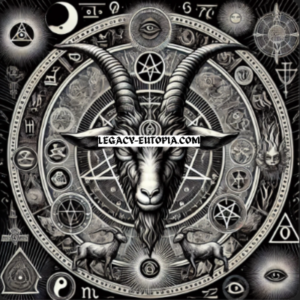Understanding The Sigil of Baphomet
Symbolism and Significance
Explore the history, meaning, and significance of the Sigil of Baphomet, a powerful symbol in occult practices.

Home > Spiritual Practices Affirmations, Meditation & more…
Understanding the Sigil of Baphomet
The Sigil of Baphomet is a prominent symbol associated with the Church of Satan and represents the embodiment of the duality of human nature. Often depicted as a goat’s head encircled by a pentagram, this sigil has become a powerful emblem in various occult practices, symbolizing the union of opposites.
The origin of the Sigil of Baphomet dates back to the 19th century, where it was popularized by the occultist Éliphas Lévi. Lévi used the image to illustrate the concept of duality, showcasing the balance between good and evil, light and darkness, male and female. This sigil is often viewed as a representation of the human experience, encompassing both the carnal and spiritual aspects of life.
In modern practices, the duality pentagram symbol serves as a tool for personal empowerment and self-discovery. Practitioners may meditate on this personal empowerment symbol to explore their inner desires, confront their fears, and embrace their true selves. The sigil encourages individuals to reject societal norms and embrace their authentic identities.
The symbol is also associated with various rituals and magical workings. Many practitioners believe that invoking the satanic goat symbol can help in gaining knowledge, achieving personal goals, and manifesting one’s desires. Its potent imagery acts as a focal point for concentration, allowing practitioners to channel their energies effectively.
Despite its controversial nature, this ritual magic symbol has garnered attention beyond occult circles, appearing in popular culture and art. Its striking design and rich symbolism continue to captivate those seeking to understand the complexities of existence.
In conclusion, the Sigil of Baphomet stands as a powerful reminder of the balance between opposing forces and the importance of embracing the entirety of one’s being.

No comments:
Post a Comment
Note: Only a member of this blog may post a comment.